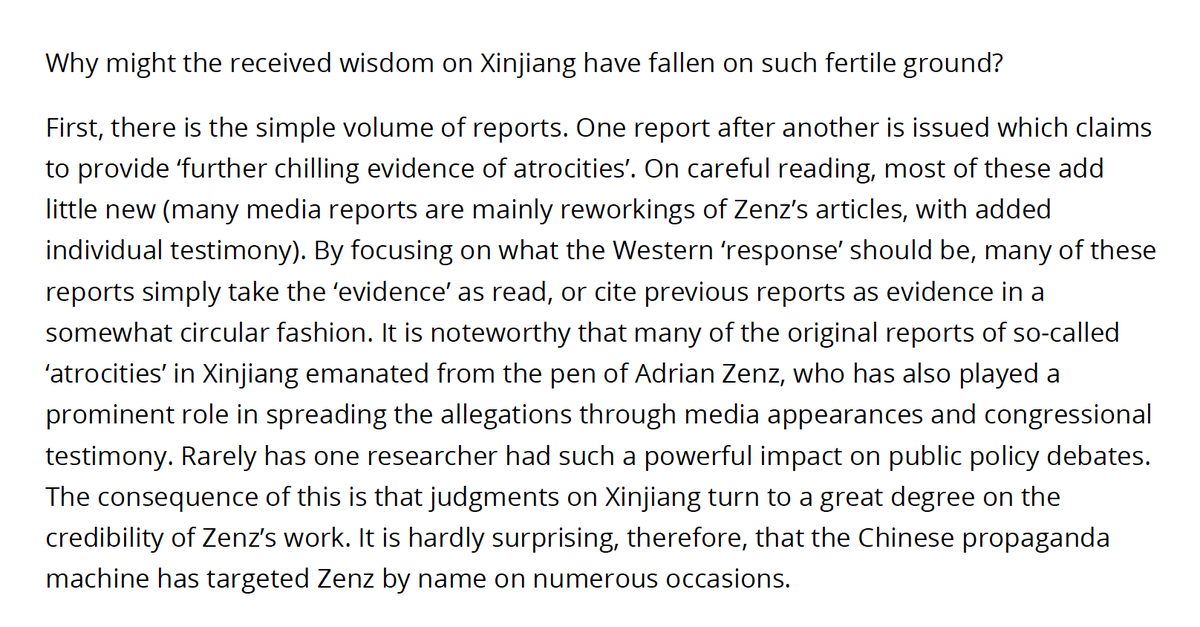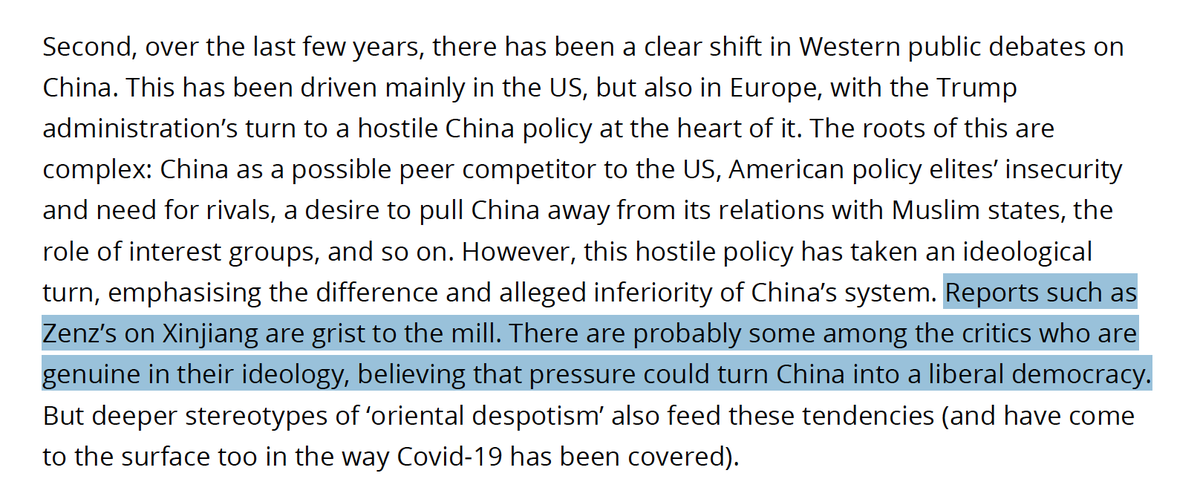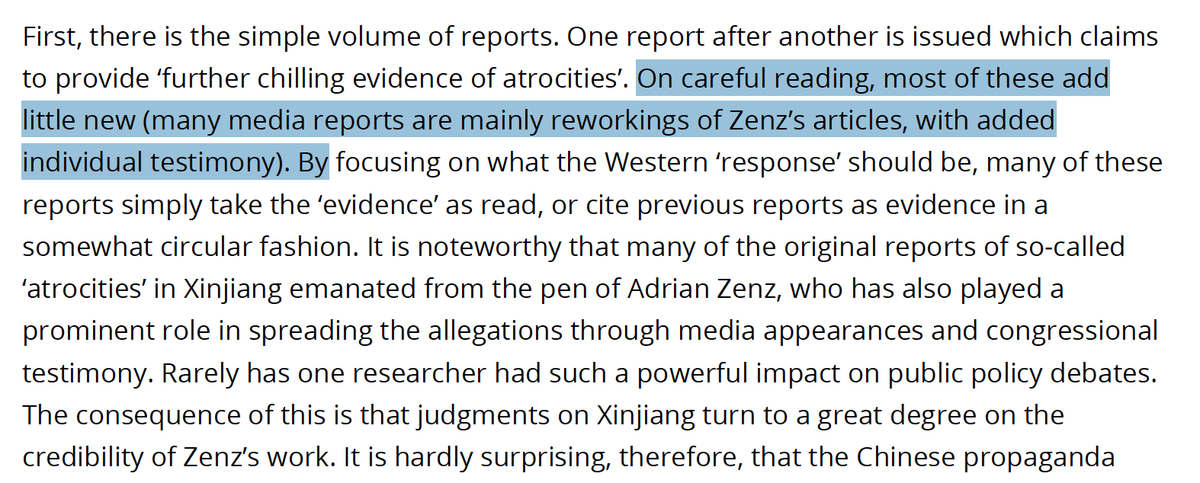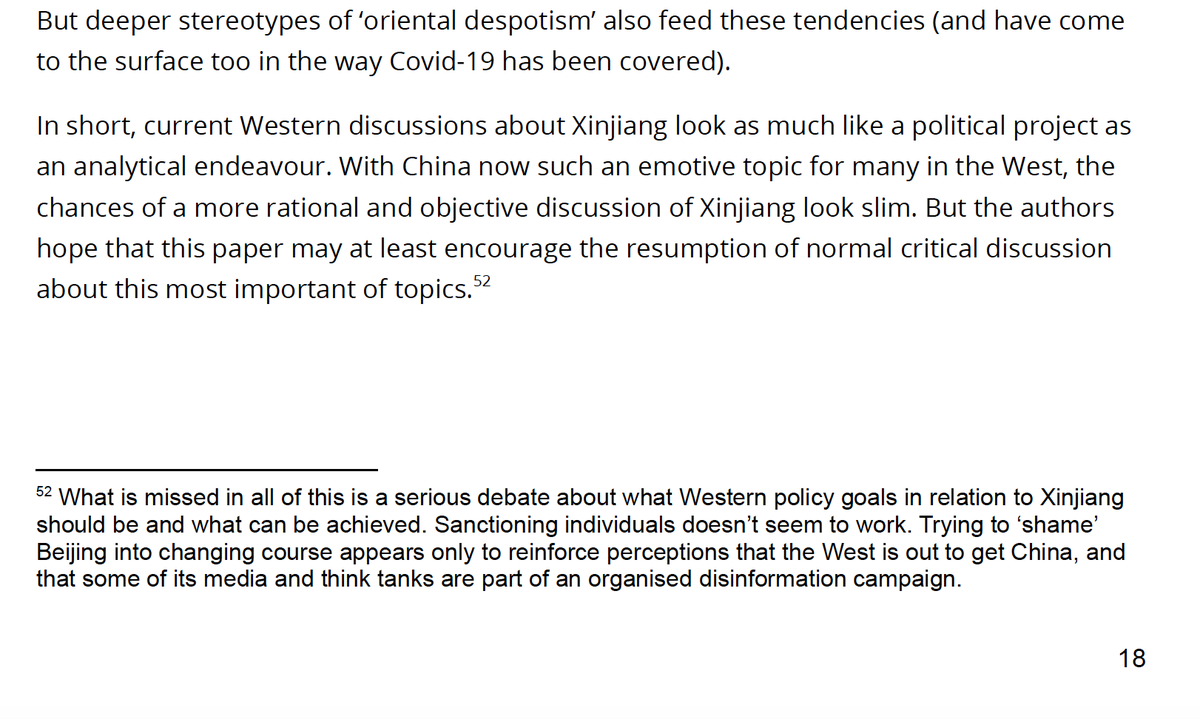THREAD on the deeper strategy behind the anonymous paper:
A careful read made me realize that the paper, while done poorly in many ways, actually represents quite a sophisticated attempt to misrepresent my work and cast doubt on the entire evidence on the atrocity.
/1
A careful read made me realize that the paper, while done poorly in many ways, actually represents quite a sophisticated attempt to misrepresent my work and cast doubt on the entire evidence on the atrocity.
/1
The basic strategy is as follows:
1. Cast the Xinjiang debate as "emotive" & "politicized"
2. Reduce key evidence to "Zenz"
3. Portray Zenz& #39;s work and method as questionable through an obfuscating / distorted discussion of his work
4. Question the whole "so-called & #39;atrocity& #39; "
/2
1. Cast the Xinjiang debate as "emotive" & "politicized"
2. Reduce key evidence to "Zenz"
3. Portray Zenz& #39;s work and method as questionable through an obfuscating / distorted discussion of his work
4. Question the whole "so-called & #39;atrocity& #39; "
/2
Instead of ad hominem against me, the authors take a more sophisticated & dangerously deceptive approach:
1. Portray my method as haphazard / heavily interpolating, ignoring evidence given on multiple levels
2. Cite only a small part of my evidence and call it insufficient
/3
1. Portray my method as haphazard / heavily interpolating, ignoring evidence given on multiple levels
2. Cite only a small part of my evidence and call it insufficient
/3
3. Quote multiple numbers from my piece in rapid succession to confuse the reader, then call my quantitative analysis confusing.
4. Don& #39;t ever engage with my original sources, but do quote Chinese state media sources (some in Chinese) against me
/4
4. Don& #39;t ever engage with my original sources, but do quote Chinese state media sources (some in Chinese) against me
/4
5. Quickly move from aspect to aspect (forced labor, internment, sterilization), never going in real depth, but pick randomly at different bits. This gives the impression as if that was my approach, too (and as much is implied).
/5
/5
6. In fact, some of the biggest distorting effect of the paper is the way that my work is presented: in seemingly enough depth for less experienced readers, but always haphazardly, moving from bit to bit.
This presentation method is designed to portray my method as such. /6
This presentation method is designed to portray my method as such. /6
Instead of direct ad hominem, the authors throw in a little allegation, which smoothly integrates into their narrative:
"a major aim of [Zenz& #39;s] report [on cotton] is to lobby international businesses to disconnect themselves from supply chains"
/7
"a major aim of [Zenz& #39;s] report [on cotton] is to lobby international businesses to disconnect themselves from supply chains"
/7
The authors conclude that my work neatly fits into political scheming:
"Reports such as Zenz’s on Xinjiang are grist to the mill. There are probably some among the critics who are genuine in their ideology, believing that pressure could turn China into a liberal democracy."
/8
"Reports such as Zenz’s on Xinjiang are grist to the mill. There are probably some among the critics who are genuine in their ideology, believing that pressure could turn China into a liberal democracy."
/8
The authors then argue that all evidence on Xinjiang "turns out" to be a circular reference to some claim made by Zenz:
/9
/9
"One report after another is issued which claims to provide ‘further chilling evidence of atrocities’. On careful reading, most of these add little new (many media reports are mainly reworkings of Zenz’s articles, with added individual testimony)."
/10
/10
The authors then set themselves up as the rational voice in this politically-emotively laden mania:
"In short, current Western discussions about Xinjiang look as much like a political project as
an analytical endeavour. ..."
/11
"In short, current Western discussions about Xinjiang look as much like a political project as
an analytical endeavour. ..."
/11
"...With China now such an emotive topic for many in the West, the chances of a more rational and objective discussion of Xinjiang look slim. But the authors hope that this paper may...encourage the resumption of normal critical discussion about this most important of topics."/12
In sum, the strategy to give an appearance of critically but constructively questioning my work is likely to fool a good number of people, and has already had some apparent success.
This is a dangerous development that won& #39;t be contained by publishing more evidence. /13
This is a dangerous development that won& #39;t be contained by publishing more evidence. /13
Rather, it requires a robust and open debate among academia, rigorous and timely fact-checking of new denialist work, and the sober realization that certain groups have and will continue to have a vested interest in more or less sophisticated attempts to deny this atrocity. /14
Addendum: all of this makes me ponder whether some of the paper& #39;s "mistakes" regarding the discussion of my work could actually be deliberate misrepresentations of my work rather than actual mistakes. /15

 Read on Twitter
Read on Twitter
![Instead of direct ad hominem, the authors throw in a little allegation, which smoothly integrates into their narrative:"a major aim of [Zenz& #39;s] report [on cotton] is to lobby international businesses to disconnect themselves from supply chains"/7 Instead of direct ad hominem, the authors throw in a little allegation, which smoothly integrates into their narrative:"a major aim of [Zenz& #39;s] report [on cotton] is to lobby international businesses to disconnect themselves from supply chains"/7](https://pbs.twimg.com/media/E0EYSagVcAMwNKT.png)





